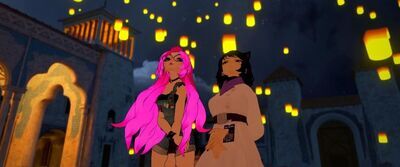
Joe Hunting’s one-of-a-kind debut features all the makings of a traditional documentary—including one-on-one talking-head interviews and observational footage. And yet the images weren’t captured in our live-action plane, but in VRChat, a virtual reality platform where users have full-body control over their avatars to interact with one another.
Through the friendships and romantic bonds that have developed in this intangible social realm, “We Met in Virtual Reality” examines the benefits of immersive escapism, which for many represented an invaluable lifeline during the early days of the ongoing pandemic.
Based on what the director captured entirely in-world, one can see that the vast majority of users adopt avatars that resemble female anime characters with animal ears and/or tails. There are outliers like the 3D embodiment of Kermit the Frog or a Gremlin, but the vast majority select aesthetically imposing figures as their vehicles to navigate this world.
From the onset, the filmmaker makes the community aspect of VRChat a clear focus. Among the handful of subjects he chose, Jenny is the poster child for the most altruistic of uses for this online kingdom. She spends her time as this version of herself teaching ASL to a full class of virtual students who are not only learning to sign, but to do so with the mobility limitations of their digital incarnations. Similarly, DustBunny, another young woman, teaches belly dancing.
To further illustrate the depth of the affection that can emerge between people on here, Hunting follows DragonHeart and IsYourBoi, two users who in real life live thousands of miles apart but have fallen in love over a year and a half of constant contact in VRChat.
These CG environments offer a place where all of these presumably young individuals can free themselves from the expectations that society imposes on their gender, their sexual identity, and their bodies. Entering VRChat is a rebirth, an opportunity to start over without baggage and visually present more authentically, even if that means becoming a voluptuous animated entity or a colorful anthropomorphic furry creature.
Their new form, detached from who they are behind the screen, allows for a purer mode of engagement between people, whether platonic or amorous, where gender, race, and physical appearance lose all importance and individuals get to know one another solely on the basis of their personalities. But while the utopian possibilities of this futuristic interpretation of interpersonal understanding impresses, it all seems unrealistically ideal.
Hunting’s overly positive portrayal of these online communities never once mentions how the platform deals with bullying or conflict. And even more frustrating is that the director opted not to provide any context as to how this space operates, the devices required for users to plug into this alternative life, the time commitment, or any of the potential negative side effects that this extra existence has on the offline relationships of its participants. By heralding VRChat as a miraculous invention, he renders the film skin-deep.
Early on, a scene in a virtual strip club raises questions about the safeguards in place to protect underage users in some of the more hyper-sexualized worlds. The lack of any pushback regarding some of the questionable or at least concerning aspects of VRChat, in tandem with how little we learn about its mechanics, prevents one from truly concentrating on the humanistic portraits alone. These inquiries nag at you as you watch.
From a visual standpoint, “We Met in Virtual Reality” also demonstrates how nascent the technology still is. Often the 3D characters glitch, unflatteringly blend into the backgrounds, and still move with a certain stiffness that inevitably reminds one of graphics on bygone simulation games like “The Sims.” A few years from now we might look at the interface and capabilities of something like VRChat with the same condescension for outdated technology that the early consoles, computer sets, and cell phones inspire today.
Nevertheless, Hunting repeatedly surprises with the lyrical beauty he elicits from this brightly colored microcosm. Most memorable among these instances are an evocative piano performance that one could even call spiritual, or a scene where Ray, a deaf user, bids farewell to a loved one under the moonlight as floating lamps fly into the digital sky.
There are framing choices and camera movement that ensure we undeniably understand what Hunting accomplished with filmmaking, even if done with resources outside of what we are accustomed to perceiving as cinema. His subjects move with similar agency as they would in their physical bodies and the truths they share so candidly, likely because their faces or real names are never on screen, speak of real pain and joy in their own voices.
Perhaps the greatest example of the impact that VRChat and similar platforms can have on people is the symbolic wedding between DragonHeart and IsYourBoi, a sequence where virtual tears flow. Though it ignores the many situations that could go wrong in the ever-evolving universe of virtual reality, this fascinating ode to touchless connection proves beyond doubt that the intense emotions born in the skin of their avatars transcend into their flesh-and-blood hearts.
On HBO Max today.
0 Commentaires